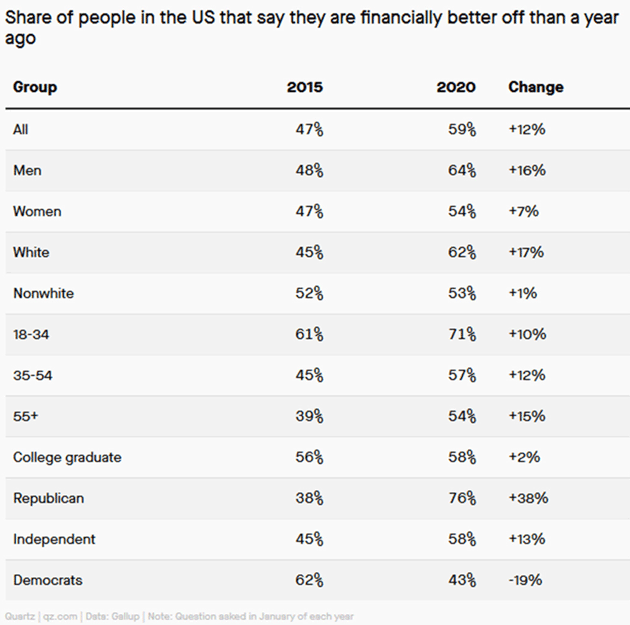Why Americans Want Socialism
As I write this, a self-proclaimed “democratic socialist” is leading the race for one of our major parties’ presidential nomination. The fact that so many Americans (especially young Americans) support Bernie Sanders ought to tell us something. A Quinnipiac poll out this week showed Senator Sanders with 54% support among Democrats age 18–34. Meanwhile, 50% of adults under 38 told the Harris Poll last year that they would “prefer living in a socialist country.”
I don’t believe they really want socialism. Few even understand what it is. What they want is change. They see little hope for improvement in their situations, no matter how hard they work and sacrifice. They don’t see anyone in authority trying to help them. So, when someone offers what sound like easy answers, they jump aboard. As Harvard professor Ed Glaeser says (my paraphrase), people think of socialism as “hyper-redistribution.” They are not looking to control the means of production per se, just redistributing the fruits of that production.
In one regard, Sanders is similar to Trump in 2016—an outsider whose message activates previously neglected voters. Trump went on to win. If Sanders gets the nomination, it’s easy to imagine scenarios where he wins, too.
That the US could plausibly swing from someone like Trump to someone like Sanders in the space of four years says, to me at least, that something bigger is happening. Until we fix it, desperate people will keep making desperate choices.
This week’s letter will be a little bit different in that I want to focus on why so many of our fellow citizens find socialist ideas attractive. And why, even in the face of that, I am a long-term optimist. For those paying attention, there has never been a time so potentially dangerous but still offering so many incredible opportunities. But first…
The Decade of Living Dangerously
Because of the frustrations of so many, both left and right, I think volatile swings between radically different political choices could become de rigeur for at least the next three election cycles, if not longer. The simple fact is that no political solution can deliver economic nirvana. But until something happens (like The Great Reset) to force unwelcome change, the cycle will continue. And that is a reality we as investors have to face.
What’s the Appeal?
To my generation, “socialism” is the second “S” in USSR. We grew up being taught the Soviet Union was a mortal foe bent on world domination. We didn’t have to wonder if this adversary had nuclear weapons; we knew it could drop them on us any time. Remember “duck and cover” drills?
Thankfully, the threat of imminent nuclear war receded, and attitudes changed in those who didn’t grow up with it. A 1974 poll showed 75% of Americans aged 25 to 34 thought the US had “moved dangerously close to socialism.” Now 50% of young Americans want to embrace what they think of as socialism.
Its meaning isn’t entirely clear to older generations, either. This Mises Institute article does a good job outlining the ideologies we call “socialism.” Broadly speaking, they involve various degrees of collectivizing property and redistributing wealth. Those can sound pretty attractive if you have no property or wealth, and threatening if you do.
This raises a question: If the US economy is performing so well, and the rising tide is lifting all boats, why is socialism getting any traction at all? Public opinion data says this shouldn’t be happening. Polls from Gallup and others find solid majorities saying their financial condition improved in recent years, or at least got no worse.
I see two answers to that. One is in the question itself. Your financial condition can be better than it was but still not where you think it should be. If you are no longer drowning and are instead treading water with no lifeboat in sight, then yes, your condition has “improved.” But you’re still looking for answers.
The broad “better or worse” responses are heavily weighted by political affiliation. Republicans say both their own condition and the economy are better. Democrats say both are worse. They can’t all be right.

Source: Quartz
Polls that ask more specific questions find a considerably less rosy scenario.
For instance, a December 2019 Bankrate.com survey found half of US workers didn’t get any kind of pay raise in the last year. Gains in average hourly earnings may have been heavily weighted toward a smaller number of workers who got much larger raises.
Another survey by Salary Finance of 2,700 US adults working at companies with 500+ employees found 32% saying they ran out of money between paychecks. That’s consistent with the Federal Reserve’s annual “SHED” survey, which last year found almost 40% of US adults would need to borrow money to cover a $400 emergency expense. It also found an additional 18% of Americans considered themselves “just getting by” and 7% “finding it difficult to get by.”
Disclaimer: The Mauldin Economics website, Yield Shark, Thoughts from the Frontline, Patrick Cox’s Tech Digest, Outside the Box, Over My Shoulder, World Money Analyst, Street Freak, Just One ...
more



I doubt if the Fed will ever offer the real fix that would avoid socialism such as redistribution of profits. That fix is Helicopter Money. That is a one off large gift to every citizen from the Fed balance sheet.